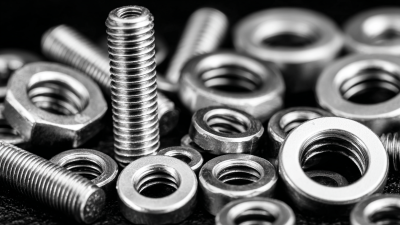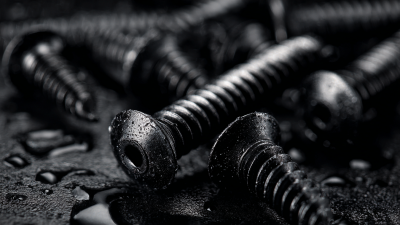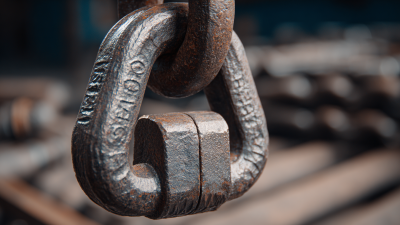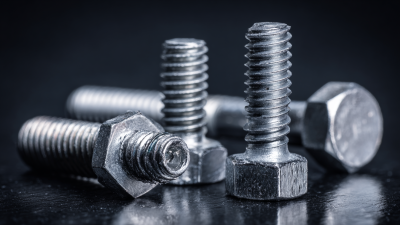In the realm of modern manufacturing, the quest for enhanced efficiency, reliability, and innovation has led to the emergence of various advanced fastening solutions, among which "Threaded Rivets" have gained significant attention. According to a report by the Industrial Fasteners Institute, the global market for fasteners is projected to reach $100 billion by 2025, driven by the increasing demand for lightweight and durable materials in automotive, aerospace, and construction sectors. Threaded rivets, with their unique design allowing for greater load-bearing capacity and resistance to vibration, are revolutionizing assembly processes. By providing superior joint integrity and simplified installation, these innovative fasteners not only reduce manufacturing time and costs but also improve overall product quality. As industries continue to seek competitive advantages, understanding the multifaceted benefits of threaded rivets becomes essential for staying ahead in this fast-paced landscape.

Threaded rivets have emerged as a game-changer in modern manufacturing, particularly when it comes to enhancing strength and durability in assembly processes. According to a report by the Industrial Fasteners Institute, threaded rivets exhibit remarkable tensile strength, providing approximately 30% greater load-bearing capacity compared to traditional rivets. This improved strength not only supports larger and heavier components but also contributes to the overall reliability of assembled products, making them ideal for industries such as aerospace and automotive, where precision and safety are paramount.

Additionally, threaded rivets offer superior resistance to various environmental factors, including corrosion and temperature fluctuations. A recent study published in the Journal of Materials Science indicated that components joined with threaded rivets maintained structural integrity under extreme conditions, often outperforming their non-threaded counterparts by a significant margin. This durability translates to longer service life and reduced maintenance costs, which are critical factors for companies aiming to optimize their production processes and improve their bottom line. By integrating threaded rivets into their manufacturing practices, companies can not only achieve robust assemblies but also enhance their operational efficiency in an increasingly competitive market.
In the fast-paced landscape of modern manufacturing, efficiency is paramount, and one innovative solution gaining traction is the use of threaded rivets. By streamlining assembly processes, these fasteners not only enhance operational speed but also improve precision. Traditional fastening methods often require multiple steps and additional components, leading to increased production time and potential errors.
Threaded rivets, with their integrated design, simplify this process by allowing for quick insertion and secure fastening in a single action.
Moreover, the versatility of threaded rivets contributes significantly to assembly efficiency. They can be employed across various materials, including metals and composites, enabling manufacturers to consolidate their fastening inventory. This adaptability reduces the need for specialized tools and decreases the time spent on training personnel. As a result, production lines can operate with greater fluidity, minimizing downtime and maximizing output. The combination of rapid assembly and reliable performance positions threaded rivets as a game-changer in modern manufacturing, ultimately pushing the industry towards greater heights of efficiency.
Threaded rivets have emerged as a game changer in the industrial fasteners market, showcasing their remarkable versatility across various industries. From automotive to aerospace and construction, these fasteners accommodate a range of applications where traditional riveting may fall short. The ability to provide strong, durable connections with an easy installation process makes threaded rivets an appealing choice for manufacturers looking to streamline production while ensuring high-quality results.
In applications where disassembly may be necessary, threaded rivets offer a significant advantage. Unlike permanent rivets, they can be easily removed and replaced without damaging the surrounding materials, making maintenance more efficient. Additionally, the use of different raw materials, such as metal and plastic, enhances the adaptability of threaded rivets, allowing industries to select the right fit based on specific requirements such as weight, strength, and environmental resilience. This multifaceted functionality contributes to their growing popularity, affirming threaded rivets as a staple in modern manufacturing practices.
| Benefit | Description | Industry Applications |
|---|---|---|
| Enhanced Strength | Threaded rivets provide superior joint strength compared to traditional rivets. | Automotive, Aerospace |
| Ease of Assembly | Simplifies the assembly process by providing a secure fastening with minimal tools. | Electronics, Machinery |
| Vibration Resistance | Reduces the risk of loosening due to vibrations in high-performance applications. | Aerospace, Transportation |
| Corrosion Resistance | Available in coatings that protect against rust and degradation. | Construction, Marine |
| Load Distribution | Evenly distributes load across a wider area, reducing stress concentrations. | Manufacturing, Heavy Equipment |
| Multi-Material Compatibility | Can be used to join different materials together securely. | Furniture, Aerospace |
| Customization Options | Available in various sizes and finishes, tailored to specific needs. | Consumer Goods, Automotive |
In the evolving landscape of modern manufacturing, the focus on sustainability and cost-efficiency is paramount. Threaded rivets have emerged as a game-changing solution that significantly reduces material waste and production costs. Unlike traditional fastening methods, which often require excess material during installation, threaded rivets provide a precise and secure fastening solution that optimizes the use of raw materials. This precision not only minimizes waste but also enhances structural integrity, ultimately extending the longevity of manufactured products.

Moreover, the application of threaded rivets streamlines assembly processes, reducing the time and labor needed for fastening. This efficiency translates into cost savings as manufacturers can allocate resources more effectively, leading to enhanced productivity. Lower labor costs combined with reduced material usage create a compelling case for adopting threaded rivets in various applications. By prioritizing innovative fastening methods like these, manufacturers can not only improve their operational efficiency but also contribute to a more sustainable and responsible production environment.
Threaded rivets are revolutionizing modern manufacturing by significantly enhancing join integrity and structural performance in various applications. Unlike traditional rivets, threaded rivets feature a built-in screw mechanism that allows for a more secure and reliable fastening. This innovation provides manufacturers with a versatile fastening solution that can withstand greater loads and resist loosening over time. The ability to create a strong threaded connection ensures that components stay tightly fastened, even under extreme conditions, which is crucial in industries such as aerospace, automotive, and construction.
Moreover, the use of threaded rivets facilitates easier assembly and disassembly of components. This is essential in designs that require maintenance or replacement, as it minimizes downtime and costs associated with complex disassembly processes. By improving join integrity through enhanced mechanical interlocking and reducing the need for additional fastening elements, threaded rivets contribute to streamlined manufacturing workflows. The benefits of incorporating these innovative fasteners into modern design not only enhance product reliability but also support the ongoing quest for lightweight and robust structures, paving the way for future advancements in engineering and technology.






